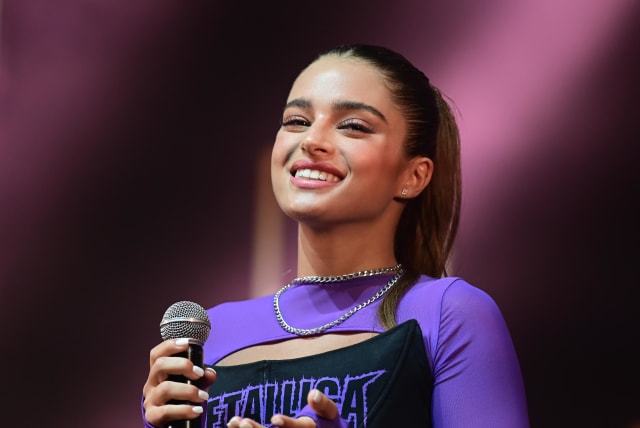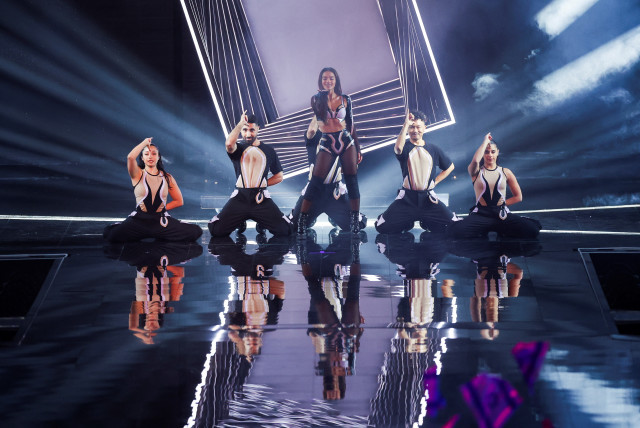Eurovision: Israel's Noa Kirel banned political questions in interviews

Israel's 2023 Eurovision representative Noa Kirel had earlier said she would come prepared for any political questions from foreign media but has since banned foreign outlets from asking them.
Israel's 2023 Eurovision Song Contest representative Noa Kirel would only accept interviews from international news outlets as long as they didn't ask any political questions about Israel, Ynet reported.
Speaking to Walla! Culture, Noa Kirel's spokeswoman Shir Pinto confirmed this report, which said that the reason for this condition is that "this is a music competition and we prefer not to talk about politics."
A senior official at KAN, Israel's Public Broadcasting Corporation, told Walla! Culture, "I didn't know about this. It's very problematic in my opinion."
When asked if they felt this infringed on freedom of the press, a KAN spokesperson said that the condition was solely the work of Pinto, Kirel's own personal spokeswoman. KAN had nothing to do with it.
Later, Pinto changed tack on whether international news outlets could ask Kirel political questions.
"On the turquoise carpet, everyone can ask anything and everyone asked everything freely," Pinto said.
"I was approached with requests for interviews and I asked what the spirit of the interviews was. I asked them to focus on music because it is a song contest and not a European Union political conference. It's my job as a PR manager to do the best thing for my client. Noa is well-informed and knows how to answer everything. The freedom of the press hasn't been harmed."
At a press conference two months ago after Kirel revealed Israel's Eurovision song "Unicorn" for the first time, this reporter had a short interview with Kirel, during which she was told: "At this press conference, you have positive and easy interviewers from Israel who love you and all want you to win first place. In Europe, they won't be as nice. Have you started preparing how to answer political questions that foreign media outlets will likely ask you? Israel is currently receiving a lot of criticism for judicial reform. Are you worried about these questions and that they might cost you votes?"
At the time, Kirel answered: "It's obvious that there are concerns because politics is also involved in Eurovision. I haven't started preparing yet because I'm currently going through each thing. The song just came out and the music video just came out. I'm letting people – and myself – get used to it. Of course, I will go through everything because I want to come prepared. I know I represent Israel and that I will likely be asked questions that aren't the most fun in the world. It's a downside, but in the end, I represent my home country. I represent Israel, which is such an amazing and advanced country, so I will be ready for any and all questions."
Despite this, it seems Kirel may not have arrived prepared for political questions, or that her fears overcame her ability to properly answer them.
Political questions for Israel at Eurovision
There are no rules at the Eurovision press conferences about asking political questions, and while most representatives are usually just asked questions like "Who designed your dress" and "How did you make your hair so beautiful," Israel's artists are usually asked political questions.
The only time there was ever a restriction on a political question was at the 2019 Eurovision Song Contest in Tel Aviv when rockets were fired at the South on the day of rehearsals. The European Broadcasting Union retracted this restriction the next day.
This year, the press conferences were canceled, so the turquoise carpet was the first chance for the press to speak to the 37 Eurovision representatives.
Due to Israel's unique political situation, its representatives always attract a lot of attention.
On the carpet, moderators asked Kirel about her song, "Unicorn."
She replied: "You have just three minutes to present yourself and your culture – it's a challenge, but I like challenges. It was important for me to bring 'Unicorn' and its message to the world, a message of personal empowerment, to be who you are, to love yourself as you are and to embrace the uniqueness and diversity that exists in all of us."
Jerusalem Post Store
`; document.getElementById("linkPremium").innerHTML = cont; var divWithLink = document.getElementById("premium-link"); if (divWithLink !== null && divWithLink !== 'undefined') { divWithLink.style.border = "solid 1px #cb0f3e"; divWithLink.style.textAlign = "center"; divWithLink.style.marginBottom = "15px"; divWithLink.style.marginTop = "15px"; divWithLink.style.width = "100%"; divWithLink.style.backgroundColor = "#122952"; divWithLink.style.color = "#ffffff"; divWithLink.style.lineHeight = "1.5"; } } (function (v, i) { });

